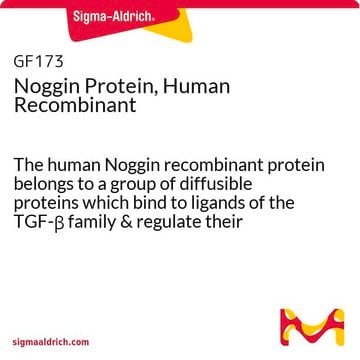N6784
Noggin/Fc Chimera from mouse
>95% (SDS-PAGE), recombinant, expressed in NSO cells, lyophilized powder
Sign Into View Organizational & Contract Pricing
All Photos(1)
About This Item
Recommended Products
biological source
mouse
Quality Level
recombinant
expressed in NSO cells
Assay
>95% (SDS-PAGE)
form
lyophilized powder
mol wt
55-60 kDa by SDS-PAGE (reducing)
calculated mol wt 50 kDa
packaging
pkg of 50 μg
impurities
endotoxin, tested
UniProt accession no.
storage temp.
−20°C
Gene Information
mouse ... Nog(18121)
Biochem/physiol Actions
Binds and blocks the acitivity of bone morphogenetic proteins (BMPs). Mature mouse noggin shares 99% and 83% sequence identity with human and Xenopus noggin, respectively.
Physical form
Lyophilized from a 0.2 μm filtered solution in phosphate buffered saline.
Analysis Note
The biological activity is measured by its ability to inhibit recombinant human BMP-4 induced alkaline phosphatase activity in ATDC5 cells.
Storage Class Code
11 - Combustible Solids
WGK
WGK 3
Flash Point(F)
Not applicable
Flash Point(C)
Not applicable
Personal Protective Equipment
dust mask type N95 (US), Eyeshields, Gloves
Choose from one of the most recent versions:
Already Own This Product?
Find documentation for the products that you have recently purchased in the Document Library.
Impaired osteoblastic differentiation, reduced bone formation, and severe osteoporosis in noggin-overexpressing mice.
Wu XB
The Journal of Clinical Investigation (2003)
D A Lim et al.
Neuron, 28(3), 713-726 (2001-02-13)
Large numbers of new neurons are born continuously in the adult subventricular zone (SVZ). The molecular niche of SVZ stem cells is poorly understood. Here, we show that the bone morphogenetic protein (BMP) antagonist Noggin is expressed by ependymal cells
The expression patterns of gremlin 1 and noggin in normal adult and tumor tissues.
Laurila R
International Journal of Clinical and Experimental Pathology (2013)
TGF-beta superfamily members and ovarian follicle development.
Knight PG and Glister C
Reproduction (Cambridge, England) (2006)
Noggin antagonism of BMP4 signaling controls development of the axial skeleton in the mouse.
Wijgerde M
Developmental Biology (2005)
Our team of scientists has experience in all areas of research including Life Science, Material Science, Chemical Synthesis, Chromatography, Analytical and many others.
Contact Technical Service







